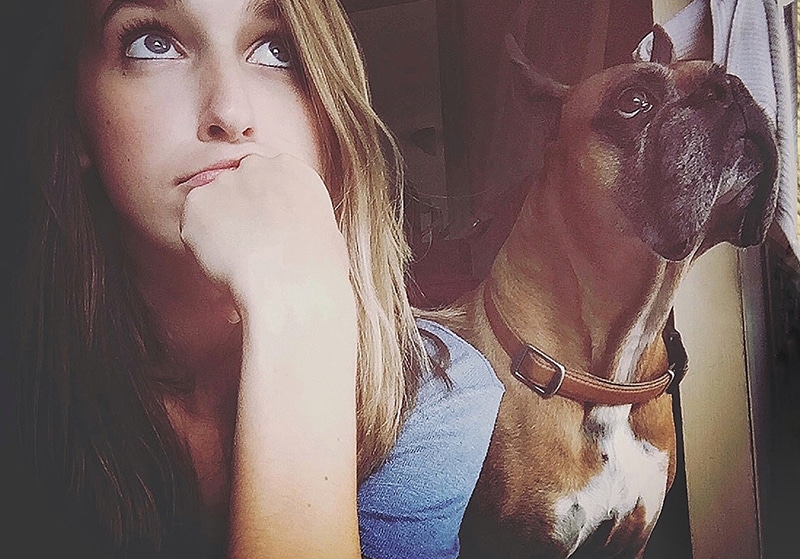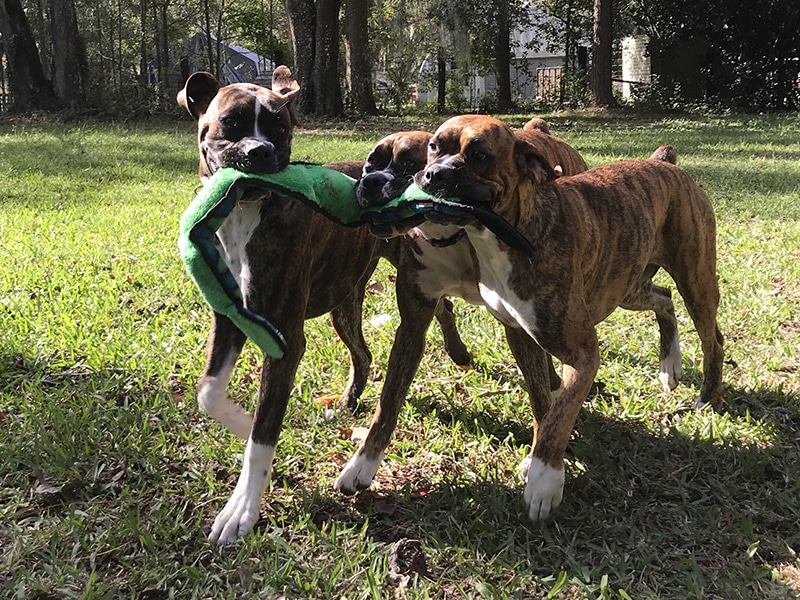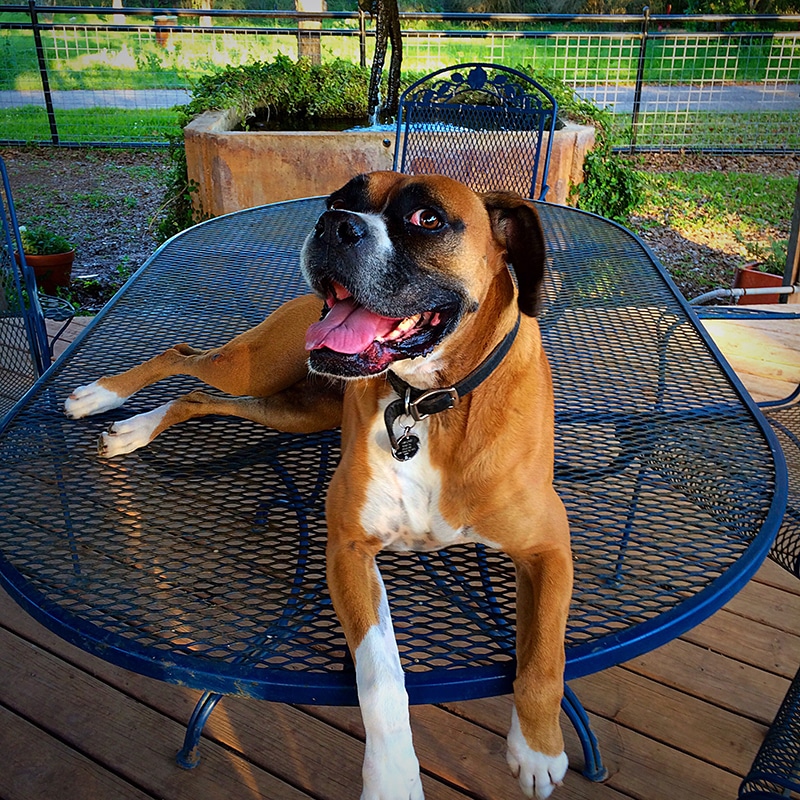Picking the best dog food for your Boxer can be a challenging task. As you know, your Boxer doggie tends to have a healthy appetite and gains weight pretty quickly if her diet is unbalanced. Therefore, you have to make plenty of decisions, from considering Fido’s life stage and health requirements to ensure that she gets all the proper nutrients from the highest quality sources. All of this with the abundance of information might be overwhelming.
I used my 12 years of Veterinary experience and reviewed over 100 dog food products to find the best dog food for Boxers.
After considering the nutritional needs along with genetic health conditions that Boxers tend to have, I found that “ORIJEN Senior Grain-Free Dry Dog Food” is the best overall food for adult Boxers. In addition to meeting my dietary criteria for Boxers, it has the best combination of nutrients and quality sources.
But I understand that no two Boxers are alike, and your Boxer might have a different life stage or have different needs. That’s why I prepared a shortlist of the best Boxer foods that address the most common Boxers needs.
In addition to picking the best products for your pooch, I outlined my process for choosing dog food. I want you to know what gets inside the furry stomach. The process is written in plain & simple English that will help you make wiser dietary decisions for your Boxer.
I encourage you to read our review process and check out our in-depth reviews below so that you’ll be able to come up with your own dietary decisions.
Let’s get started.
Before You Pick The Best Food For Your Boxer

There’s no such thing as one food that fits all Boxers. While I did my best to find the best food for most Boxers, you might prefer to pick a more specific formula.
That’s why I elaborate here our main considerations while reviewing the best dog foods for Boxers.
You can divide your research journey into 3 steps:
- First, pick the right food for your Boxer’s life stage – Puppies, Adults, and Senior Boxers are in different development stages. Their joints, bones, and muscles develop at a different pace. That’s why you’ll need to pick the proper nutrients in the correct quantity for your Boxer’s life stage.
- Picking the right food to reduce common Boxer health issues – Each dog breed has an increased risk of catching certain health conditions. These health conditions are genetic, and Boxers are not indifferent. So make sure to pick the right ingredients to support common Boxer health issues.
- Picking suitable nutrient sources – Sometimes, two dog foods might seem similar. Both could provide the same nutritional value. However, it’s essential to question how these nutrients were sourced. We want to avoid chemicals and low-quality nutrients that can introduce some side effects.
The rest of the guide will show you how to pick the right food for your Boxer’s life stage, how diet helps with common Boxer health issues, and what to look for on the label.
For your convenience, I (Dr. Libby Guise) shortlisted 15 dog foods. These foods were carefully selected and should satisfy your Boxer’s needs. I also noted which food is best for certain life stages or particular health issues.
After going through the shortlist, you can find additional considerations that might be of interest to you and your fur-baby.
Finally, I answered the most popular questions that I’m being asked regarding Boxers’ nutrition and diet.
Please keep in mind, while I tried to do my best to find the best food for your Boxer, it would be a good idea to understand how and why we made our decisions.
The recommendations in this review are not intended to replace the doctor-patient relationship. Always consult your veterinarian before making major adjustments to your furbaby’s diet.
The Right Diet For All Life Stages

Often playful and affectionate, Boxers are a muscular, medium-large breed with high energy needs. Due to years of inbreeding, these pups have some unique nutritional considerations.
Like the French Bulldog, Pug, and some others, Boxers have a flat face and can suffer from a range of related structural issues. They’re also at risk for some common hereditary joint problems, heart disease, allergies, and other health issues, which we’ll discuss later.
As with other breeds, the first thing your boxer needs at any age is high-quality lean proteins from poultry, meat, and fish. Adults should have about 25-35% protein to support their muscle mass, but. Puppies need more (at least 22%) to provide key amino acids for growth and development.
The product should also have a low (minimum 5% for adults and 8% for puppies) to moderate fat content from healthy sources. Ingredients such as chicken fat or fish oil provide essential fatty acids including DHA and omega fatty acids for energy as well as heart, brain, skin, and coat health. Carbohydrates should come from quality whole grain, fruits, and garden vegetables. These ingredients also supply digestible fiber for gut health and.
A balanced blend of essential minerals and vitamins should include the proper proportion of calcium and phosphorus for strong bones. Natural sources of glucosamine and chondroitin can help to support cartilage maintenance and repair. Because Boxers have a predisposition for heart disease, look for products with L-carnitine and taurine to support cardiac health.
Daily Calorie Requirements
How many calories does your furbaby need daily? That answer depends on your pup’s age, activity level, and weight.
- Puppies: These puppies will need approximately 55 calories per pound per day to power growth and activity. This value may vary up to 20%, depending on activity level.
- Adolescents: Between about 18 and 24 months, Boxers enter an adolescent stage when their energy needs can be higher. If your pooch can’t maintain a healthy lean weight, and you start noticing ribs, increase the caloric intake slightly above 55 calories per pound.
- Adults:
- Adults with average activity will need approximately 25-30 calories per pound.
- A more active boxer, such as one used for hunting, may need 35-40 calories per pound.
- Seniors: Seniors boxers may have a slight decrease in activity and energy needs. They will be closer to needing around 25 calories per pound.
Feeding Quantity & Frequency
As with calories, the amount of food your boxer needs will change with growth and age. We can give general guidelines here, but you should also consult the feeding guidelines on your dog’s food for a starting point. Increase the amount slightly if you start noticing his ribs, and decrease the portion slightly if you can’t feel his ribs through a thin layer of fat and muscle. That being said, you can generally expect your pooch to eat about:
- Puppies (0-2 years) – 1-5 cups of kibble per day depending on age and weight.
- Adults (2-8 years)/ Seniors (8+ years) – 3-5 cups of kibble per day depending on weight and activity level
With their high energy needs, you should divide your Boxer’s daily portion into meals.
Younger puppies (up to 12 weeks) can be free-fed to ensure they’re getting the calories they need. From the 3 month stage to adulthood (approximately 2 years), offer three meals a day. After that, you can feed your pooch in the morning and evening.
The Appropriate Nutrition For Common Boxer Health Issues

Some health conditions are more popular among Boxers than other dog breeds. Each breed inherits some genes that can be associated with certain health issues.
It doesn’t mean that Fido is going to develop these conditions. It just means that Boxers have a higher chance as compared to other breeds.
However, it’s possible to reduce the risk by proactively feeding Boxer with the right nutrients. Here we list the most common Boxers health issues and how certain nutrients can reduce risk.
A quick reminder: if you think your special pal suffers from any of these conditions, schedule an exam with your veterinarian to confirm your suspicions. Even with healthy dogs, these dietary recommendations may help prevent future problems. Always check with Fido’s doctor before making changes in his diet.
Degenerative Myelopathy
An inherited neurological condition, degenerative myelopathy (DM) in boxers is a progressive disease affecting the spinal cord. Usually beginning with muscle weakness and loss of coordination, symptoms begin in the senior years and can eventually result in paralysis. There is no treatment or cure for DM.
Fortunately, you can provide supportive nutrition to help manage the disease. Bromelain, found in pineapple, is a powerful antihistamine that may minimize inflammation. Vitamin B-12, folic acid, and iron support the nervous system and aid cellular health. Antioxidants from whole fruits and vegetables help to battle cellular degeneration.
Joint Health
As a large-breed dog, Boxers can suffer from malformation of the hip socket known as hip dysplasia, degenerative canine arthritis, and panosteitis or growing pains.
To help support your pal’s joints regardless of the condition, look for foods that include:
- The proper balance of calcium and phosphorus to foster healthy, strong bones
- Glucosamine and chondroitin to support joint and cartilage health
- Sources of omega fatty acids to manage inflammation
- Quality proteins from animal sources to build lean muscle mass
Hypothyroidism
Hypothyroidism is a common disease among Boxers. When the thyroid gland fails to produce enough hormone, dogs may show weakness, lethargy, increased appetite, weight gain, cold sensitivity, and problems with the hair and skin.
For pups with this disease, you should avoid starchy ingredients like sweet potato, beef by-products, cruciferous vegetables, and soy-based foods. Dietary support of hypothyroidism includes foods with rich sources of lean proteins, digestible carbs from fruits and vegetables, and no artificial ingredients. Other beneficial materials include:
- Zinc and selenium to support the thyroid
- Omega 3 fatty acids and biotin for healthy coat and skin
- Probiotics to support digestive function
Skin and Coat Problems
Often a secondary condition to a disease such as allergies or hypothyroidism, Malassezia dermatitis is a yeast infection of the skin. It causes redness, irritation, hair loss, scaly skin, and foul odor. Such yeast infections can be linked to another skin problem that’s common in boxers, seborrhea. With seborrhea, the skin secretes a greasy substance that accumulates in skin folds and causes irritation and infections.
To support your boxer’s integument, provide key nutrients including:
- A balanced blend of essential minerals such as zinc
- Omega 3 fatty acids for skin and coat health
- Antioxidants to promote cellular health
Because allergies can contribute to these conditions, avoid foods with common allergens such as soy and gluten.
Seizures and Epilepsy
A seizure is a surge of brain activity leading to drooling, muscle twitching, and other spasms. Boxers can be prone to developing epileptic seizures. Although the cause is usually unknown, the convulsions can be triggered by allergic reactions, a sudden drop in blood sugar, or high blood pressure. Whatever the underlying trigger, epileptic seizures are usually treatable with medication and diet. If you suspect your pup has had a seizure or may have epilepsy, schedule an exam with your vet.
To support your pal’s condition:
- Provide food that’s high in healthy fats. Omega 3 and 6 fatty acids may help to manage neuron activity and decrease the frequency and severity of seizures.
- Offer a well-balanced diet with quality proteins and carbohydrates can ensure your pup has enough energy for his metabolism.
- Avoid soy, dairy, complex carbohydrates, and materials that contain gluten to prevent allergic reactions.
Ear Infections
External ear conditions that commonly affect boxers are usually from yeast or bacteria. If your pooch is scratching his ears a lot, shaking his head, or having trouble with balance, contact your veterinarian. These infections usually require medication and professional ear cleaning.
Dietary management of recurrent ear infections includes:
- Omega fatty acids to support healthy skin and coat
- Vitamin E and antioxidants for cellular and immune health
- Allergen-free foods – avoid materials like wheat, soy, and corn
Heart Disease
Boxers have a predisposition for developing cardiomyopathy in which the muscle beats inefficiently. This condition leads to fainting, coughing, arrhythmias, heart failure, and death. Another common heart disease for boxers is aortic stenosis or narrowing of the aortic valve. The constriction puts extra stress on the muscle and prevents complete emptying of the left ventricle. Pups with this condition may be unaffected or can show exercise intolerance, fainting, and lethargy.
When considering a heart-healthy diet, look for products that have low or restricted sodium. Offer food with quality whole food ingredients that help your pal maintain lean muscle mass and keep off unwanted pounds. Nutrients that may support the cardiac muscle include antioxidants, B vitamins, L-carnitine, taurine, and vitamin E.
Stomach Issues
- Bloat
As a large, deep-chested breed, the Boxer is prone to bloat and a twisted stomach. When the stomach distends with fluid and gas, it can twist on its axis, causing a life-threatening condition. Fortunately, bloat is usually preventable by offering smaller, more frequent meals and encouraging your pup to eat dinner more slowly. If your boxer is a habitual food gulper, try using a slow-feed dog dish.
- Inflammatory Bowel Disease and Ulcerative Colitis
Boxers can suffer from inflammation of the large and small intestines. The most common cause is Histolytic Ulcerative Colitis (HUC). Pups with these conditions will have diarrhea, may have black stools or fresh blood in the feces, flatulence or burping, and possible vomiting. Untreated pups tend to lose weight. The inflammatory conditions can be a result of stress, infections, allergies, or other triggers.
In addition to medical treatment, a well-balanced diet can help your pooch manage either of these conditions.
- Provide a constant supply of water to keep your pal hydrated
- Look for products with quality proteins that are readily digestible
- Target a moderate fat content from healthy sources
- Use digestible highly carbohydrates that provide fiber to add bulk
- Avoid soy, wheat, corn, or other potential allergens.
- Choose foods with probiotics to help soothe the gut
- If you know your furbaby has trigger foods, you may want to go with a limited ingredient diet to avoid those materials.
Allergies
Like many other breeds, Boxers can develop allergies to food or substances in the environment. Depending on the source of the allergen, a pup may have:
- Itchy, red skin
- Poor quality coat
- Vomiting and diarrhea
- Coughing, sneezing, or wheezing
- Watery, red eyes
If you think your furbaby suffers from allergies, schedule an examination with his veterinarian.
To help manage allergic reactions and symptoms choose foods with omega fatty acids. These nutrients help to support the skin and coat and help fight inflammation. If your pal has a food sensitivity, select an allergen-free or limited ingredient diet. Novel protein sources such as venison and duck may help prevent inflammatory reactions. Because many boxers are sensitive to grains or gluten, avoid materials like corn, wheat, and soy.
Bleeding Disorder
Hereditary bleeding disorders that can occur in Boxers include:
- Von Willebrand’s Disease – a clotting disorder that leads to prolonged bleeding time following injuries or surgery and bruising
- Factor VII deficiency – usually mild cases of bruising rather than overt bleeding problems
- Prothrombin disorder – bleeding problems that range from mild to moderate in severity
These bleeding disorders have no cure, but with some precautions and nutritional support, you can help your pal enjoy life. Stick with low-impact activities like walks to prevent injury or potential bruising. Because Omega 3 fatty acids and vitamin E may cause blood thinning and prolonged clotting times, stay away from products that have high levels of these ingredients. On the other hand, helpful nutrients include:
- Vitamin C and K to support clotting
- Copper and Iron for red blood cell production
- B-complex and Vitamin A to support blood production
Cushing’s Disease
In some Boxers, the adrenal glands start to overproduce cortisol. These pups develop Cushing’s disease which is characterized by increases in eating, drinking, peeing, and body weight along with decreases in energy and muscle tone.
A combination of medications and diet can help manage the symptoms. Proper food for dogs with Cushing’s disease starts with low fat, moderate fiber, and digestible proteins. Look for quality sources of lean meats or eggs. Pick products that are low in calcium, sodium, and chloride.
Dental Disease
Many dental problems in Boxers are tied to their underbite. Their mouths tend to trap bacteria and food debris leading to an issue known as gingival hyperplasia, or thickening of the gums. If owners don’t regularly care for their Boxer’s teeth, their furbaby may develop bacterial infections of the gums and teeth. Untreated, these conditions lead to rotting teeth and could cause systemic infections of the heart, kidneys, joints, and liver.
You can help prevent dental disease in your boxer by regularly brushing his teeth. Additionally, feed your pooch crunchy kibble to help scrape food debris from the teeth. Look for products with natural, quality ingredients. Helpful nutrients include antioxidants that support cellular health, vitamin E to boost immunity, and omega fatty acids to manage inflammation.
Ensuring High-Quality Nutrients

Now that you have information about the basic nutritional needs of Boxers and how to adjust their diets to prevent some common health conditions, we need to ensure that the nutrient sources are best of class.
- Kibble Size – With their flat face and underbite, Boxers can have difficulty chewing large kibble. Look for small to medium-sized bits. Some kibble that’s designed for boxers has a special shape to accommodate their short muzzle.
- Age Appropriate – Make sure you feed puppy food to puppies and adult food to adults. Juvenile boxers need products that are formulated for growth to help ensure they have the nutrients they need for proper development.
- Whole Protein is the Main Ingredient – Boxers need a high protein diet to support their lean muscle mass. Pick products that list quality protein sources from lean muscles as the first ingredient. Avoid meat by-products. Chicken, turkey, salmon, venison, and bison are examples of quality protein sources for boxers.
- Sensitivity – Due to their tendency for food allergies and sensitivities, choose foods that have quality, natural materials and are allergen-free. Avoid cheap fillers and cereals, and products with gluten. Select highly-digestible ingredients to help support gut function.
- Ingredients to Avoid – To help prevent digestion issues, avoid corn, soy, and cereal grains. Stay away from meat and animal derivatives and poultry byproducts. These materials can include animal parts such as lungs, hooves, and feathers.
- Free of Chemical Ingredients – Choose products made using natural ingredients. Artificial flavors and colors can trigger food sensitivities and other issues. Some preservatives like BHA, BHT, propylene glycol, Ethoxyquin, and nitrates/nitrites may contribute to cancer. Pick natural preservatives including tocopherols and herbs.
- Complies with AAFCO nutritional requirements – The AAFCO conducts scientific studies to determine nutritional requirements for pet and livestock foods. Look for a statement on the packaging or with other product information that indicates the food meets AAFCO standards for complete and balanced nutrition.
- Includes Probiotics and Other Helpful Nutrients –
- To support your pooch and help to manage or prevent common ailments, look for the following:
- Probiotics can help soothe a sensitive gut and support digestion.
- The proper balance of calcium and phosphorus for bone growth and maintenance
- Glucosamine and chondroitin for cartilage and joint health
- Antioxidants and vitamin E for cellular health and immunity
- L-carnitine and taurine for heart health
- B-complex vitamins
- Contains Low to Moderate Fat – Boxers don’t require high percentages of fat in their diet. With their tendency to develop heart or joint disease, you want to provide a diet that won’t pack on unwanted pounds and put stress on their systems. Look for products that are lower in fat.
- Limited Number of Ingredients – If you have a furbaby with food sensitivities, offering a balanced diet made from limited ingredients may be helpful. That way you can more readily avoid products with trigger foods.
- From a Trusted Source – Countries like the United States, Canada, Australia, and the United Kingdom follow good manufacturing practices to ensure a safe product. Check the label to make sure the food was manufactured in a trusted country.
Our 2026 Review For 15 Dog Foods For Boxers

We reviewed over 100 products by following the process presented above and classified the best of them based on everyday Boxer needs.
We considered the life stage, common Boxer health issues for each pick and ensured it has the best nutrient sources.
Taste of the Wild Ancient Prairie
- First 5 ingredients: Buffalo, Pork, Chicken Meal, Grain Sorghum, Millet
- Key feature: high protein, moderate fat
- Guaranteed Analysis: 32% Crude Protein,18% Crude Fat,3% Crude Fiber, 10% Moisture
- Caloric Content: 422 kcal/cup
- Type of Product: Whole-grain dry dog food
- Life Stage: Adult
- Best for: Overall Pick
- AAFCO Statement: formulated to meet the nutritional level established by AAFCO Dog food nutrient profile for maintenance
With novel protein as the first ingredient, this formula provides a rich balance of essential amino acids to support Boxer musculature. The moderate fat content features healthy sources of omega fatty acids to fuel an active lifestyle and keep the skin and coat looking their best.
Ancient
whole grains, garden vegetables, and fruits add antioxidants, essential minerals, and vitamins for balanced nutrition. The formula features digestible ingredients, prebiotic fiber, and probiotics for gut health and function.
L-carnitine and taurine combine with B-complex vitamins for heart health. There are no artificial ingredients or preservatives in the food.
Customers say their Boxers like the flavor and have energy when they eat this food.
Wellness Complete Health Large-Breed Puppy Recipe
- First 5 ingredients: Deboned Chicken, Chicken Meal, Peas, Ground Brown Rice, Salmon Meal
- Key feature: High protein, moderate fat
- Guaranteed Analysis: 29% Crude Protein,13% Crude Fat,5% Crude Fiber, 10% Moisture
- Caloric Content: 367kcal/cup
- Type of Product: Natural ingredient dry dog food
- Life Stage: Puppy
- Best for: Boxer Puppies
- AAFCO Statement: formulated to meet the nutritional level established by AAFCO Dog food nutrient profile for growth
Quality lean protein is the first ingredient in this food. The balanced blend of amino acids and healthy fats provides the energy and building blocks for a growing puppy. The chicken meal also offers natural sources of glucosamine and chondroitin for healthy joints and cartilage.
Whole grains, fruits, and vegetables offer digestible ingredients for a sensitive stomach. The product includes a balanced blend of dietary fiber and probiotics to soothe the gut and keep stools firm.
A proper blend of calcium and phosphorus is included for bone development and strength. Natural sources of omega fatty acids including DHA helps to promote healthy skin and coat and to manage inflammation.
Customers love the ingredients in this product and share that their pups have energy and appear healthy when they eat the food.
ORIJEN Senior Grain-Free Dry Dog Food
- First 5 ingredients: Deboned Chicken, Deboned Turkey, Atlantic flounder, Cage-Free Eggs, Whole Atlantic Mackerel
- Key feature: high-protein, grain-free dog food
- Guaranteed Analysis: 38% Crude Protein, 15% Crude Fat, 8% Crude Fiber, 12% Moisture
- Caloric Content: 414 kcal/cup
- Type of Product: Whole food, grain-free
- Life Stage: Senior
- Best for: Senior
- AAFCO Statement: formulated to meet the nutritional level established by the AAFCO Dog food nutrient profile for all life stages
This protein-rich food has the right nutrient balance for an active adult boxer. With 85% of the ingredients coming from fish or poultry sources, the formula features a balanced blend of essential amino acids for lean muscle mass. There are no exotic proteins in the formula that could contribute to a risk of developing DCM.
The moderate fat content includes essential fatty acids such as omega fatty acids for skin and coat health. Natural sources of glucosamine and chondroitin provide for joint health. The formula has a balanced blend of minerals including calcium and phosphorus for strong bones.
Digestible fruits and vegetables offer rich sources of antioxidants and other essential nutrients. Prebiotic fiber and probiotics support digestive function. The turkey, flounder, and giblets also provide taurine to support heart health.
Customers report that their dogs love to eat this food, and it helps them maintain a healthy weight.
Victor Select Nutra Pro Active Dry Dog Food
- First 5 ingredients: Chicken Meal, Blood Meal, Whole Grain Millet, Chicken Fat, Yeast Culture
- Key feature: fresh and raw/freeze-dried ingredients
- Guaranteed Analysis: 38% Crude Protein, 18% Crude Fat, 3.5% Crude Fiber, 9% Moisture
- Caloric Content: 401kcal/cup
- Type of Product: high protein
- Life Stage: Adult
- Best for: Budget
- AAFCO Statement: formulated to meet the nutritional level established by the AAFCO Dog food nutrient profile for all life stages
With a high protein content sourced from real chicken, this food provides essential amino acids to support your pal’s lean muscle mass. Chicken meal is also a natural source of glucosamine and chondroitin for joint health.
The moderate to high-fat content and digestible carbohydrates provide energy for an active Boxer. Menhaden fish meal provides essential omega fatty acids to promote healthy skin and coat and manage inflammation. Probiotic organisms help to soothe the gut and support healthy digestion.
The formula features digestible ingredients to prevent stomach upset. There are no artificial additives or preservatives in the food.
Owners say feeding this product to their dogs helps keep them in great shape and firms up the stool.
ORIJEN Regional Red Grain-Free Dry Dog Food
- First 5 ingredients: Deboned Beef, Deboned Wild Boar, Deboned Goat, Deboned Lamb, Lamb Liver
- Key feature: High protein, moderate fat for an active lifestyle
- Guaranteed Analysis: 38% Crude Protein,18% Crude Fat,4% Crude Fiber, 12% Moisture
- Caloric Content: 440 kcal/cup
- Type of Product: Dry dog food
- Life Stage: All Stages
- Best for: Active Boxers
- AAFCO Statement: formulated to meet the nutritional level established by the AAFCO Dog food nutrient profile for all life stages
Packed with protein, this formula provides the amino acids your pup needs to maintain healthy lean muscle mass. The first 16 ingredients in this food come from animal sources. A moderate level of healthy fats offers energy to fuel your pal’s activity level.
Digestible whole foods, prebiotic fiber, and probiotic organisms help support gut function. Natural sources of omega fatty acids including EPA and DHA foster healthy skin and coat.
The formula includes a balanced blend of calcium and phosphorus for strong bones. Natural sources of glucosamine and chondroitin help to ensure joint and cartilage health.
Boxer owners say their pups like to eat this food, and it gives them plenty of energy.
Chicken Soup for the Soul Dry Food for Senior Dogs
- First 5 ingredients: Chicken, Turkey, Chicken Meal, Turkey Meal, Cracked Pearled Barley
- Key feature: high protein, moderate fat
- Guaranteed Analysis: 23% Crude Protein,12% Crude Fat, 5% Crude Fiber, 10% Moisture
- Caloric Content: 360kcal/cup
- Type of Product: Dry Food
- Life Stage: Adult
- Best for: Boxer Seniors
- AAFCO Statement: formulated to meet the nutritional needs established by the AAFCO Dog Food Nutrient Profiles for Maintenance
With sources of animal protein for the first four ingredients, this food offers a rich source of essential amino acids to support your aging boxer’s lean muscle mass. Chicken and Turkey meals are also excellent natural sources of glucosamine and chondroitin for healthy joints.
The low to moderate fat content in this formula provides adequate energy for your pup’s activity level while helping him stay lean and fit. Omega fatty acids help keep the skin healthy and coat shiny.
This product features whole foods from healthy grains, garden vegetables, and fruits to provide a rich supply of antioxidants and essential nutrients. Prebiotic fiber and probiotics aid healthy digestion.
Owners that feed this food say their dogs like the flavor, and it’s easy on the tummy.
Holistic Select Adult Health Lamb Meal & Oatmeal Recipe
- First 5 ingredients: Lamb Meal, Oatmeal, Peas, Rice, Chicken Fat
- Key feature: digestible ingredients
- Guaranteed Analysis: 23% Crude Protein,15% Crude Fat,4.5% Crude Fiber, 10% Moisture
- Caloric Content: 454 kcal/cup
- Type of Product: Dry dog food
- Life Stage: Adult
- Best for: Heart Health
- AAFCO Statement: formulated to meet the nutritional level established by AAFCO Dog food nutrient profile for maintenance
With a rich source of protein to support your pal’s muscles, this formula also contains taurine for heart health. The moderate fat content comes from healthy sources including omega fatty acids to manage inflammation and promote skin and coat health.
Whole fruits and vegetables provide a rich source of antioxidants to support cellular repair. There’s a balanced blend of essential vitamins and minerals for overall health.
Supplemented with a cocktail of probiotic organisms and digestive enzymes, this food is made to be easy on the gut. There are no artificial ingredients in the formula.
In addition to being heart-healthy, owners report that this food is easy on the stomach and helps with digestive issues.
Nature’s Recipe Grain-Free Salmon, Sweet Potato & Pumpkin Recipe
- First 5 ingredients: Salmon, Garbanzo Beans, Peas, Menhaden Fish Meal, Pea Starch
- Key feature: Grain-free
- Guaranteed Analysis: 27% Crude Protein,12% Crude Fat,4% Crude Fiber, 10% Moisture
- Caloric Content: 336cal/cup
- Type of Product: Dry adult food
- Life Stage: Adult
- Best for: Weight Loss
- AAFCO Statement: formulated to meet the nutritional needs established by the AAFCO Dog Food Nutrient Profiles for maintenance
With salmon as the first ingredient, this food offers a protein-rich diet to promote lean muscle mass. The lower protein content helps prevent unwanted weight gain.
Natural sources of healthy omega fatty acids support a healthy coat and skin. Grain-free digestible carbohydrates from sweet potato and pumpkin provide the energy your pooch needs to fuel his activity level.
The formula includes a balanced blend of calcium and phosphorus for strong bones and taurine for heart health. There are no corn, wheat, soy, or artificial ingredients in the product.
Customers say their dogs like the flavor, the low fat helps pups maintain a healthy weight, and the pumpkin keeps stools regular and firm.
Solid Gold Barking at the Moon High-Protein Recipe
- First 5 ingredients: Duck, Turkey Meal, Pea Protein, Dried Eggs, Potatoes
- Key feature: High Protein, Grain-Free
- Guaranteed Analysis: 41% Crude Protein,18% Crude Fat,4% Crude Fiber, 10% Moisture
- Caloric Content: 440 cal/cup
- Type of Product: Grain-free dry dog food
- Life Stage: Adult
- Best for: Sensitive Stomach
- AAFCO Statement: formulated to meet the nutritional needs established by the AAFCO Dog Food Nutrient Profiles for maintenance
With duck and turkey meal as the first two ingredients, this food offers digestible protein for your Boxer’s muscles. The moderate fat content features healthy omega fatty acids that help manage inflammation.
The grain-free formula relies on low levels of digestible carbohydrates to provide added energy without irritating the gut. Probiotic cultures and prebiotic fiber soothe and support digestion.
Superfoods including pumpkin, blueberries, and cranberries provide a rich source of antioxidants for cellular health. This formula has all-natural ingredients and includes a balanced blend of essential nutrients.
Owners of dogs with sensitive stomachs say feeding this formula helped reduce smelly gas and firm up the poop.
AvoDerm Natural Chicken Meal Dry Dog Food
- First 5 ingredients: Chicken Meal, Ground Brown Rice, Ground White Rice, Oatmeal, Chicken Fat
- Key feature: all-natural with avocado
- Guaranteed Analysis: 23% Crude Protein,13% Crude Fat, 4% Crude Fiber, 10% Moisture
- Caloric Content: 360 kcal/cup
- Type of Product: All natural dry dog food
- Life Stage: Adult
- Best for: Skin Allergies
- AAFCO Statement: formulated to meet the nutritional needs established by the AAFCO Dog Food Nutrient Profiles for Maintenance
Starting with chicken meal, this protein-rich, highly digestible food provides essential amino acids as well as glucosamine and chondroitin for joint and muscle health. The moderate fat features rich sources of omega fatty acids to support healthy skin and a shiny coat.
Natural sources of digestive enzymes and probiotic cultures foster digestive health. The formula includes a balanced blend of essential nutrients.
With rice and oatmeal, this formula is free of corn, wheat, and soy. Vitamin E promotes immune health. There are no artificial ingredients or preservatives in the product.
Owners of dogs with allergies say feeding this food helps clear up dandruff, itchy skin, and other symptoms.
Natural Balance L.I.D. High-Protein Pollock Formula Dry Food
- First 5 ingredients: Pollock, Garbanzo Beans, Peas, Whitefish Meal, Pea Protein
- Key feature: limited-ingredient
- Guaranteed Analysis: 32% Crude Protein,14% Crude Fat,4.5% Crude Fiber, 10% Moisture
- Caloric Content: 367cal/cup
- Type of Product: Dry LID adult food
- Life Stage: Adult
- Best for: Allergies
- AAFCO Statement: formulated to meet the nutritional needs established by the AAFCO Dog Food Nutrient Profiles for maintenance
Starting with pollack as a rich protein source, this limited ingredient diet features low-allergen foods. The high protein content provides the amino acids your Boxer needs for healthy muscles.
With fish ingredients, the moderate fat features healthy omega fatty acids to support the coat and skin and help manage inflammation. There are no grains, fillers, or artificial ingredients in the formula.
The product includes a balanced blend of essential nutrients for total body health. Digestible ingredients support the gut. Taurine is included for heart health.
Customers say feeding this food works for pups with food allergies. They can keep it down, and it helps clear up diarrhea and skin issues.
Blue Buffalo Wilderness Rocky Mountain Grain-Free Recipe with Red Meat
- First 5 ingredients: Deboned Beef, Fish Meal, Peas, Pea Starch, Tapioca Starch
- Key feature: high protein, moderate fat
- Guaranteed Analysis: 30% Crude Protein,15% Crude Fat, 6% Crude Fiber, 10% Moisture
- Caloric Content: 393 kcal/cup
- Type of Product: Dry Food
- Life Stage: Adult
- Best for: Joint Health
- AAFCO Statement: formulated to meet the nutritional needs established by the AAFCO Dog Food Nutrient Profiles for Maintenance
With rich sources of protein to supply essential amino acids, your Boxer will have the building blocks for healthy muscles. The beef and chicken meals also provide natural sources of glucosamine and chondroitin to support joint function and mobility.
Healthy sources of fatty acids including omega fatty acids offer essential nutrients for the skin and coat. Antioxidant-rich whole foods boost cellular health and immunity and help to moderate inflammation.
With L-carnitine to boost the metabolism, digestible whole foods, and probiotic cultures, this food is designed to help your pal maintain a healthy weight.
Customers say that their dogs like the flavor and thrive on this food.
Blue Buffalo Life Protection Formula Large Breed Senior
- First 5 ingredients: Deboned Chicken, Brown Rice, Barley, Oatmeal, Chicken Meal
- Key feature: Moderate protein, lower fat
- Guaranteed Analysis: 20% Crude Protein, 10% Crude Fat,7% Crude Fiber, 10% Moisture
- Caloric Content: 344 kcal/cup
- Type of Product: Dry dog food
- Life Stage: Adult
- Best for: Cushing’s
- AAFCO Statement: formulated to meet the nutritional level established by AAFCO Dog food nutrient profile for maintenance
This formula features lower fat and moderate fiber levels to support your pup’s metabolic needs. The protein comes from digestible lean chicken and chicken meal to be easy on the gut.
With a lower calcium content, this product should help prevent mineral deposits in the skin. The product features L-carnitine to support the metabolism and probiotics for digestive health.
Natural sources of glucosamine and chondroitin provide for joint health. Vitamin E is included to boost immunity. Whole superfoods offer rich sources of antioxidants for cellular health and function.
Boxer owners say their pups like the flavor, and the kibble is easy to eat.
Wellness CORE Grain-Free Original Deboned Turkey
- First 5 ingredients: deboned turkey, turkey meal, chicken meal, peas, potatoes
- Key feature: high protein, moderate fat
- Guaranteed Analysis: 34% Crude Protein,16% Crude Fat,4% Crude Fiber, 10% Moisture
- Caloric Content: 417 kcal/cup
- Type of Product: Grain-free, protein-rich dry dog food
- Life Stage: Adult
- Best for: Grain-free
- AAFCO Statement: formulated to meet the nutritional level established by AAFCO Dog food nutrient profile for maintenance
The first three ingredients in this food come from animal protein sources to provide the building blocks to support your Boxer’s lean muscle mass. The moderate fat content comes from healthy sources including omega fatty acids that support the skin and coat.
Whole garden vegetables and fruits provide a rich source of antioxidants for cellular repair and function. The formula has a balanced blend of essential nutrients including vitamin E for immunity and taurine for heart health.
With digestible ingredients, prebiotic fiber, and more than 80 million CFU/lb of probiotic microorganisms, this food is designed to be easy on the gut. Natural sources of glucosamine and chondroitin support joint function.
Owners who feed this food to their dogs say it’s easy on the stomach and their pups like the flavor.
Whole Earth
- First 5 ingredients: chicken, chicken broth, turkey, chicken liver, salmon
- Key feature: grain-free ground food
- Guaranteed Analysis: 9% Crude Protein,6.5% Crude Fat, 1.4% Crude Fiber, 78% Moisture
- Caloric Content: 436 kcal/can
- Type of Product: Wet Food
- Life Stage: Adult
- Best for: Wet
- AAFCO Statement: formulated to meet the nutritional needs established by the AAFCO Dog Food Nutrient Profiles for Maintenance
This protein-rich wet food is packed with poultry and salmon to provide essential amino acids. The fat content includes omega fatty acids to support skin and coat health.
With a balanced blend of vitamins and minerals and antioxidants from garden vegetables, this formula offers nutrition for whole-body health.
There are no grains or artificial ingredients in the food.
Customers who use this food for meals or as a topper say their pups love the
Foods That a Boxer Should Not Eat
It’s easy to share a little treat from your dinner plate with your four-footed friend, but is it safe? Foods that you should avoid feeding your Boxer include:
- Alcohol, including beer and hops
- Drinks with caffeine such as tea, coffee, and cola
- Candy, gum, and other sweets that contain xylitol(also found in some brands of peanut butter)
- Chocolate
- Grapes and raisins
- Fatty meats or fat trimmings
- Macadamia nuts
- Onions, garlic, and leeks
- Dairy products
- Tomatoes
- Yeast dough
Is Grain-Free Food Safe for Boxers?
You’ve probably seen ads stating that grain-free dog foods are healthier for dogs, especially if they have allergies. But is this true? In 2018, the FDA issued a warning stating a possible correlation between grain-free diets and dogs’ dilated cardiomyopathy (DCM).
Further study suggests that there may be more factors than a lack of grains combined with the diets that induce DCM. Of an estimated 20 million canines that ingest a grain-free diet, the FDA report cited only 515 cases of cardiomyopathy in dogs. What’s the difference here? Tufts Veterinary Nutritionist Dr. Lisa Freeman co-published a study that implicates a particular variety of food which she dubbed BEG diets. These products come from small boutique companies, include exotic protein sources such as kangaroo or elk, and may include grain replacements such as lentils or chickpeas in the top five ingredients.
While there is more to learn about the potential link between grain-free diets and DCM, it does raise concerns. Given that Boxers already have a genetic predisposition to Cardiomyopathy, it may be wise to avoid BEG diets. If you’re feeding your pup a grain-free diet because of allergies or sensitivities, consult with your veterinarian before making any changes. Otherwise, choose foods that have healthy whole grains like rice and quinoa rather than cereals like corn and wheat.
Frequently Asked Questions

Do boxers need large breed dog food?
Yes. Although Boxers are classified as a medium breed, they need a protein-rich, moderate-fat diet to power their higher activity level and support lean muscle mass. Large breed formulas contain the right balance of nutrients for their needs. Just remember to watch the kibble size!
How do I change my Boxer’s diet?
When transitioning from puppy to adult food or between brands of food, make a gradual change over at least a week. Start by mixing about 25% of the new formula with 75% of the old food for a few days to make sure your pal tolerates it. Then try a 50/50 blend for another few days. By about day 5, you can offer a 75% to 25% blend before feeding 100% new food at the end of the week.
Do Boxers need special dog food?
You don’t necessarily need a product that’s specially formulated for boxers as long as the food meets your dog’s nutritional needs. The key in selecting the right food for your Boxer is to look for quality ingredients with a high protein and low to moderate fat content. Make sure the kibble has a size and shape that makes it easy for your pooch to munch.
Do Boxer dogs have a sensitive stomach?
Yes, many boxers have a sensitive stomach. Focus on quality whole food ingredients that are easily digestible.
What Foods Are Boxers Allergic To?
The most common food allergens for many dogs including boxers include
- Common animal proteins from pork, fish, chicken, and beef
- Dairy products
- Cereal grains with gluten like wheat and corn
Should I Feed My Boxer dry or wet food?
As a brachycephalic breed with a high risk for dental disease, we recommend you feed your Boxer dry food to help promote healthy gums and teeth.
When should I stop feeding my Boxer puppy food?
Boxers continue growing until they’re about 18-24 months old. As a result, they’ll need to stay on puppy food until somewhere between 15 and 24 months. Consult with your veterinarian about your pup’s growth to determine the right target for your pal.
Why is eating so difficult for Boxer puppies?
Puppies are voracious eaters, but Boxers have a uniquely shaped face and mouth. Their flat face and short muzzle make it harder to chew food. You may need to look for kibble that’s specifically shaped for a Boxer to make eating easier.
Does my Boxer need a puppy-specific diet?
If your puppy has difficulty eating normal puppy kibble, you may want to look for Boxer-specific food. Otherwise, you can feed a general large-breed growth formula.
When is a Boxer considered a senior?
Boxers are considered to be seniors between 7 and 8 years of age. The average lifespan for the breed is around 9-12 years.
My Boxer is a picky eater, is it ok to free-feed him?
It’s best to avoid free-feeding your pooch. Boxers need a controlled diet to ensure proper nutrition. If your pup is a picky eater, you can try adding a small quantity of water, broth, or canned food to encourage eating.
Why is my Boxer losing weight?
The answer to this question may depend on your dog’s age. During adolescent years, Boxers go through a rapid growth stage and look skinny even though their appetite and activity levels are normal. At other times and ages, there may be an underlying medical condition. If your pup is losing weight try increasing the caloric density of the food to add more energy to the diet. Of course, if you have any concerns, schedule a check-up with your pal’s veterinarian.
How long can a Boxer go without eating?
Most dogs can generally survive 4-5 days without eating. However, if your Boxer refuses to eat more than 1-2 days, contact your veterinarian. There may be an underlying condition.
Is milk good for Boxers?
Adult Boxers don’t have the enzyme to break down milk sugars, so large quantities of dairy products can cause gastric upset and diarrhea.
What human food can a Boxer eat?
Boxers can enjoy many of the same foods as humans, for example:
- Lean meats such as chicken, salmon, turkey, and beef
- Vegetables including carrots, green beans, peas, pumpkin, and broccoli
- Fruits including cantaloupe, watermelon, apples without the seeds, and berries(avoid any pits from cherries, peaches, plums, and nectarines)
- Whole grains like rice, sorghum, quinoa, and oats
Why won’t My Boxer eat?
There are several reasons why your Boxer isn’t eating, including
- Upset stomach – like us, dogs can experience nausea
- A change in surroundings or routine
- Recent vaccination
- Stress
- Picky eater
- Another pet is intimidating him
- Illness
If your pal skips more than a few meals, talk with your veterinarian to help figure out the cause.
Can Chicken Harm a Boxer?
For most Boxers, lean deboned chicken is an excellent source of protein. However, if your pooch has a food allergy to chicken, you should avoid this as a food ingredient. And never feed chicken bones because they can splinter and puncture the intestines.
What is the worst food for a Boxer?
There are many foods listed above that are dangerous to feed any dog. Of all the foods, some of the most toxic can be dark chocolate and candy or gum with xylitol.
Dry vs. Wet Food – Which is better for your Boxer?
Even with their underbite and smaller jaw, we recommend you feed your Boxer dry food. Crunchy kibble can help build jaw strength and keep the teeth and gums clean. The higher fiber and lower moisture content may also promote firmer stools.
If you have a picky eater, don’t despair. It’s ok to mix in a small amount of water, low-sodium broth, or canned food(use the same brand as your kibble) to encourage your pal to eat.
The Final Woof

Boxers have unique nutritional needs due to their high energy and muscle mass. They require high protein and low to moderate fats to support their lifestyle without adding unwanted weight.
These pups can also suffer from joint problems and food allergies or sensitivities. So they need healthy fats and sources of glucosamine and chondroitin. In addition, digestible ingredients and probiotics are essential for their gut health.
We recommend ORIJEN Senior Grain-Free Dry Dog Food as the best dog food for boxers based on these characteristics and criteria. This product provides the best nutrient balance to support an active, healthy adult Boxer.


